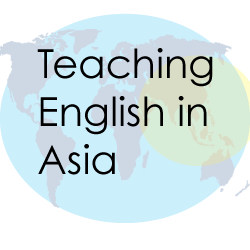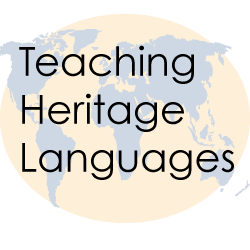Best of Bilash: Improving Second Language Education
This website weaves together eight established or evolving disciplines of knowledge:
curriculum theory, identity studies, teacher education, pedagogic content knowledge, second language education, professional development, learner voices and system's theory.
Introduction: Why this website?
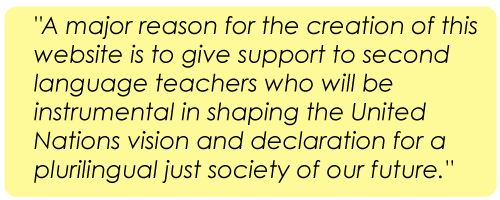
Entry to the teaching profession begins long before one enters one´s own classroom. Many teachers report that they have `always wanted to be a teacher´ and tell of stories playing with dolls, siblings or neighbourhood children in classroom-like ways. Others tell of discovering a passion for working with others through a part-time job or a subject studied at university. No matter how one arrives at the decision to become a teacher, all must become credentialized through a university program before they are certified and available for professional employment.
Admission to these teacher education programs typically calls for good grades, a statement of intent, letters of reference and sometimes even an interview. This stage in the process is taken very seriously by many groups as it is the key not only for individuals who walk through the door of the profession, but also for the profession´s future.
Whether teachers complete a Bachelor of Education, an after degree program or a Master´s of Education as their initial entry to the field, all must be seen as beginning teachers. The last few decades have seen a rise in support for beginning teachers, once hired, as a response to the frightening statistics that about 50 per cent of teachers leave the profession within their first five years of teaching. However, that statistic has not declined and despite the hard work of admission´s officers clearly we must do more to sustain membership in our profession.
The consequences of teacher drop out are long term and grave. With the baby boomer generation seeking retirement, the former pattern of having many more experienced teachers in the profession than rookies is shifting, leaving a greater number of less experienced teachers to mentor newer members into the profession. The increasing responsibilities and time consuming accountability measures in place will render teachers with less than ten years experience a new majority in the next decade. Couple this with the fact that teachers at that time in their careers are typically planning families, upgrading homes and considering doing graduate work, who is left to act as cooperating (host or mentor) teachers? Layer on to this pandemic the fact that a very small minority of all teachers are trained to be second language teachers and we see a major reason for the creation of this website - to give support to second language teachers who will be instrumental in shaping the United Nations vision and declaration for a plurilingual just society of our future.

This website is structured at the intersection of many fields of study. It is designed for the use of teachers at the beginning of their studies, those launched into their careers as well as teacher educators. Although grounded in solid academic research it acknowledges that "language teachers find it very difficult to use academic information and theoretical principles in their practice" (Bartels, 2006) and has thus been structured in teacher-friendly ways. Thus, you will hear the voices of teachers, student teachers and teacher educators in the field of second languages. You will also see graphic representations of detailed conceptual information and principles and be offered opportunities to further explore topics through links to other websites or references to other readings. At the rate of knowledge production the information on this site could become rapidly outdated; however, for now, it presents the best of Bilash´s current thinking and understanding of second language teacher education. And it responds to Marable & Raimondi´s 2007 survey that concluded that beginning teachers leave the profession due to burn out, low salary and uncaring principles such as a lack of support from administration or peers, few or old resources, and irrelevant training.
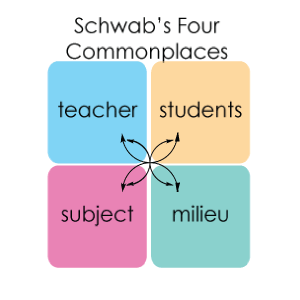 Drawing on Joseph Schwab's four commonplaces of teacher, students, subject and milieu, we know that a change in any one of the commonplaces results in a new system or community. The same group of students who learn different subjects with the same teacher in the same classroom respond differently in each subject area. Some students become more participatory in one subject; others more engaged and questioning in another. Coupled with the broad interdisciplinary trans-historical work in identity studies we also know that the investment of time, effort, interest and skill development (motivation) in a subject area by both teacher and students also leads to qualitatively different outcomes in learning.
Drawing on Joseph Schwab's four commonplaces of teacher, students, subject and milieu, we know that a change in any one of the commonplaces results in a new system or community. The same group of students who learn different subjects with the same teacher in the same classroom respond differently in each subject area. Some students become more participatory in one subject; others more engaged and questioning in another. Coupled with the broad interdisciplinary trans-historical work in identity studies we also know that the investment of time, effort, interest and skill development (motivation) in a subject area by both teacher and students also leads to qualitatively different outcomes in learning.
Teaching and learning a second language is a slow and steady process. In a technological era that has created an appetite for (and addiction to) wide spread instantaneous gratification, second language learning requires the ability to suspend the personal craving for that immediate gratification in order to learn and reach the goal of being able to communicate in the new language. In many communities a second language is considered a frill or an option through which learners garner a taste of another culture and an opportunity to learn a 'bit' of a new language. In fact some teachers are faced with keeping their program slowly paced in order to keep their program sufficiently enrolled to be sustainable. These variables often render second language teachers vulnerable to loneliness, isolation and loss of self confidence. On the other hand, some second language teachers are faced with teaching a language that is not only a compulsory subject but also a part of a high stakes examination that will determine to which school or university (or not) a student will be admitted. Students in such classes are more interested in learning what will be on the test than in learning to communicate, unless those are the same thing and sadly they rarely are.
The Voices of the Learners: Life Long Teacher Learners
We are facing a demographic change in Canada. The echo generation described by University of Toronto economist David Foot is replacing the baby boomers, both generations highly outnumbering what he calls the 'bust' generation in between. This means that the seemingly normal process of retiring senior and experienced teachers being replaced by new teachers has swung to a different balance. With more than 50 per cent of all teachers in North America leaving the profession within the first five years of teaching the experience that a school system would normally cultivate is disappearing. More and more new teachers are being mentored during their student teaching by teachers who themselves have only a few years of experience. Within this context, some areas, such as Alberta, are forecasting that 50 per cent of their teaching population will have less than five years of experience within the next decade. These statistics alone paint a picture of beginning teachers needing support in a variety of ways. While school jurisdictions have already developed an infrastructure to mentor new hires into the profession through beginning teacher conferences, regular meetings with assigned mentors and the development of job embedded professional learning communities, we in second language education must do more to retain beginning teachers and offer support to those who continue in the profession as they take on the added responsibilities of early mentorship and leadership. Through the generosity of teachers at various phases in their careers this site, acting similarly to an on-line textbook, offers visitors opportunities to hear many voices: their challenges and successes, the process they went through to gain insights into new approaches to SL teaching and to fill the theory-practice divide, some of the ideas in their repertoires, and their reflections on their overall career-long professional development. Although guided by some questions, all of the interviews are authentic; there were no rehearsed or scripted pieces.
The internet is an information and knowledge dissemination tool with enormous potential to capture the multi-layered complexity of teachers' lives. This site presents an honest and authentic glimpse of the profession of teaching second languages. While there are many similarities between teaching second languages and teaching other subjects, there are also uniquenesses in content knowledge, pedagogic content knowledge (PCK), lived experience and identity. It is hoped that this site will provide support in the form of inspiration, knowledge and ideas, a feeling of less isolation and an opportunity to reflect and reflex , in particular to the following groups:
- beginning or student teachers of second language education
- teachers in their first three years of experience
- experienced teachers eager to better understand the links between theory and practice and who also want to improve their classroom practice
- teachers who are teaching a second language primarily because they speak it (but have never been trained to teach people who do not)
- mentor or cooperating/host teachers who are guiding student teachers through a practicum or field experience
- teachers who have ESL or ELL students
- assistant teachers of English (or another language) who are native speakers but have never been trained to teach a second language
- teachers of English (EFL) in Japan, China, Korea or elsewhere
- teachers of heritage languages
- teachers of aboriginal or first nations languages
- administrators or human resources personnel engaged in hiring second language teachers
- second language consultants
- researchers of teacher education, second language teacher education and leadership
Teachers, lifelong students of teaching, must not only learn content, but critical thinking skills so as to approach the world around them with open eyes and an open heart as promoted by Unesco’s Four Pillars of Education:
learning to know
learning to do
learning to live together and
learning to be.
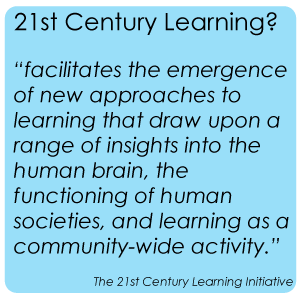 The Best of Bilash co-development team has worked hard to embody as many characteristics of 21st Century Learning ideals as possible. We have tried to provide teachers with options to consider surrounding traditional and group-based learning and assessment. Our pages show our willingness to change, to learn, to use technology, as well as the leadership necessary to spread this desire to other teachers. Each page has been carefully designed to be as engaging and multi-dimensional as possible, and our teamwork has required significant amounts of flexibility on each person’s part to produce not just what was easiest and most efficient, but what was best.
The Best of Bilash co-development team has worked hard to embody as many characteristics of 21st Century Learning ideals as possible. We have tried to provide teachers with options to consider surrounding traditional and group-based learning and assessment. Our pages show our willingness to change, to learn, to use technology, as well as the leadership necessary to spread this desire to other teachers. Each page has been carefully designed to be as engaging and multi-dimensional as possible, and our teamwork has required significant amounts of flexibility on each person’s part to produce not just what was easiest and most efficient, but what was best.
